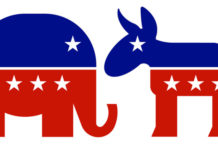I’ve heard many political ads lately, and most promise job creation with the implementation of their particular platform. But does it really work?
An interesting question came up on another thread, and has come up many times over the years. The question: in a Capitalist society, what creates a ‘job’? Let’s dig.
Not surprisingly, many think the government creates jobs. In some sense, they can. Federal, State, and local governments all can
create jobs via approving projects of work deemed necessary—building a new structure,
replacing an old structure (like a border Wall), building and/or maintaining
highways, even contracting out to Defense contractors to buy the latest military
hardware. But in all of these cases, the
government is a third party: they pay a
company, who then hires employees to get the work done. The government’s real role is to assess
demand for a thing, then approve the spending necessary to create it. Other than government employees, this form of
Demand creation is the limit of governmental job creation. Oh, they can pass laws to give tax breaks to
individuals and/or companies, that sway purchasing decisions, but that may just
satisfy the existing labor needs, not necessarily create new jobs. For example, if a Green Energy project is
undertaken, the government may either pay for said project directly (to a private
company), or create tax incentives for a company to undertake that project (the
tax break making it more lucrative to perform the project than otherwise). But since the government, as a whole, does
not have a profit motive, the net spend may be more or less efficient. If the government pays $1M to create a
windmill, and all of the salaries to do so, but the windmill only produces $50K
of electricity, the project is a fiscal negative. Now, the incentive to build said windmill may
be something other than financial, but if a private company did the same type
of project, it would go under fairly quickly, with a huge net loss to the
bottom line. But governmental spending
is hardly Capitalistic in nature.
Let’s limit this discussion to private, pure for-profit, Capitalist
companies. What creates a ‘job’? What causes a sole proprietor to hire his
first employee? What causes a small or
large company to increase its existing labor by one more position? The answer is boring Economics. Here’s an axiom that will never be wrong:
Employers will ONLY hire an additional employee for the following reasons:
1. They can produce MORE than the total cost to hire (wages + FICA match + benefits).
2. They can cut expenses MORE than the total cost to hire.
3. They can cause legal or tax compliance such that the impending fine is MORE than their total cost to hire.
The dollar amounts are not relevant. Employers hire
employees to INCREASE net income, in some flavor or another. NO employer hires
an employee to break even or lose money. Period. Whether the marginal new employee is an
entry-level person at the prevailing minimum wage, an IT person making six
figures, a new tax accountant or attorney at their market rate, or a new CEO
that will draw an enormous salary, the above three reasons still hold
true. The new person must be a net positive
financially for the company, or it will continue to operate without hiring the
new person. Where the hiring process
gets further confused is when the cost to hire gets inflated by outside
sources: mandated benefits, increases in
minimum wage, or other methods of legal or tax compliance. With an increase in the total cost to hire, the
profitability bar rises, so either the productivity requirement must increase,
the expense cut must increase, or the compliance need must increase. In some cases, companies will simply pay a
fine rather than hire someone new. How
they pay for that fine (increased prices, decreased hiring, or reduction of
owner profit—the least likely outcome) is the subject for another time. But until the amount of the potential fine is
greater than the cost of hiring someone to comply, the new position will not be
created.
Conversely, if market forces (competition, product alternatives, increase in
the cost of goods sold, etc.) cause a reduction in profit for the company,
hiring may not only stagnate, it may even decrease, causing former employees to
seek employment elsewhere. This can and
will happen when a company’s product is at the end of its natural production life
cycle. Fad toys, video games, and
non-essential products are glaring examples of such things. Razor scooters, when originally introduced,
had a demand such that retail price was in the several hundred-dollar
range. Now that that market has matured,
the same scooter can be had for under $50.
Whether due to an increase in the number of companies making scooters,
or pure market saturation, does not matter.
What matters is the number of people working, earning a living,
producing scooters, shrinks. They may or
may not be good, productive employees—but the Demand for what they produce is
reduced. Either the scooter company
finds another product to produce, at the former level of profitability, or
people will lose their jobs. The company
may even continue to operate at a net loss, short-term, until it decides what
to do. But sooner or later, the
adapt-or-fail continuing evolution of Capitalism will occur.
























